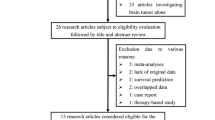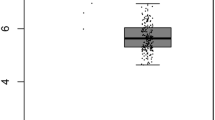Abstract
Background
Functional variants of glutathione-S-transferase (GST)-M1, GST-T1, p53 might modulate brain cancer risk by altering the rate of metabolism and clearance of carcinogens from the brain tissue. In this study, the role of GST-M1, GST-T1, p53 polymorphisms on brain tumor was investigated.
Methods and results
Brain tumor tissues of 143 patients were obtained from the Gulhane Training and Research Hospital, Department of Neurosurgery between 2019 and 2020. In the xenobiotic mechanism, the null allele frequency in the GST-T1, GST-M1 gene regions of Phase II enzymes by qPCR method were investigated. Single nucleotide polymorphism encoding Arg/Pro conversion in the p53 gene region was analyzed in 120 cases by sequence analysis method. The data were analyzed statistically with patient’s demographic and clinical data. GST-M1, GST-T1, p53 genotypes of the patient group were determined. The most frequent genotype was null genotype (0/0) for GST-M1 (χ2 = 39.756, p < 0.001). GST-M1 genotype frequencies were 30.8%, 23.1%, 44.3% for 1/1, 1/0, 0/0, respectively. The most frequent genotype was GST-T1 1/1 following by GST-T1 1/0 (χ2 = 0.335, p = 0.846). GST-T1 genotype frequencies were 64.3%, 30.8%, 4.9% for 1/1, 1/0, 0/0, respectively. GST-M1 null genotype might be associated with the development of brain tumors. Genotype distribution obtained in p53 exon 4 codon 72; Arg/Arg was determined as 31 (25.8%), Arg/Pro 70 (58.3%), and Pro/Pro 19 (15.8%) in the case group, while there were 18 (38.3%), 23 (48.9%), and 6 (12.8%) respectively in the control group. However, the genotype distribution of p53 exon 4 codon 72 among tumorous tissue did not significantly vary from healthy control tissues (χ²=2.536, p = 0.281).
Conclusion
The null allele frequency encountered in the GST-M1, GST-T1 gene regions is consistent with the rates in the gene pool called Caucasian in the literature. GST-M1 gene polymorphism may play a crucial role in brain carcinogenesis in Turkish patients. This study based on clinical data is thought to help to understand the important epidemiological features of brain tumors.


Similar content being viewed by others
Data Availability
The authors confirm that all data supporting the finding of the study are available within the article, and the raw data supporting the findings were generated and available at the corresponding author on request.
References
NIH (2023) Adult Central Nervous System Tumors Treatment (PDQ®)–Patient Version.
Wang H, Zheng Q, Lu Z, Wang L, Ding L, Xia L et al (2021) Role of the nervous system in cancers: a review. Cell Death Discov 7:76
Louis DN, Perry A, Wesseling P, Brat DJ, Cree IA, Figarella-Branger D et al (2021) The 2021 WHO classification of tumors of the Central Nervous System: a summary. Neuro Oncol 23:1231–1251
Miller KD, Ostrom QT, Kruchko C, Patil N, Tihan T, Cioffi G et al (2021) Brain and other central nervous system Tumor statistics, 2021. CA Cancer J Clin 71:381–406
Chen L, Zou X, Wang Y, Mao Y, Zhou L (2013) Central nervous system tumors: a single center pathology review of 34,140 cases over 60 years. BMC Clin Pathol 13:14
Patel AP, Fisher JL, Nichols E, Abd-Allah F, Abdela J, Abdelalim A et al (2019) Global, regional, and national burden of brain and other CNS cancer, 1990–2016: a systematic analysis for the global burden of Disease Study 2016. Lancet Neurol 18:376–393
Salari N, Ghasemi H, Fatahian R, Mansouri K, Dokaneheifard S, Shiri Mhossain et al (2023) The global prevalence of primary central nervous system tumors: a systematic review and meta-analysis. Eur J Med Res 28:39
Fan Y, Zhang X, Gao C, Jiang S, Wu H, Liu Z et al (2022) Burden and trends of brain and central nervous system cancer from 1990 to 2019 at the global, regional, and country levels. Archives of Public Health 80:209
Kucukyildiz HC (2020) Trends on central nervous system cancers in Turkey. Turk Neurosurg 30:527–531
WHO (2020) Globocan 2020; Turkey.
Jaiswal J, Shastry AH, Ramesh A, Chickabasaviah YT, Arimappamagan A, Santosh V (2016) Spectrum of primary intracranial tumors at a tertiary care neurological institute: a hospital-based Brain Tumor registry. Neurol India 64:494–501
Naser RKA, Hassan AAK, Shabana AM, Omar NN (2016) Role of magnetic resonance spectroscopy in grading of primary brain tumors. Egypt J Radiol Nuclear Med 47:577–584
Komlodi-Pasztor E, Blakeley JO (2021) Brain cancers in genetic syndromes. Curr Neurol Neurosci Rep 21:64
Oguztüzun S, Aydin M, Demirag F, Yazici U, Ozhavzali M, Kiliç M et al (2010) The expression of GST isoenzymes and p53 in non-small cell Lung cancer. Folia Histochem Cytobiol 48:122–127
Girault I, Lidereau R, Bièche I (2005) Trimodal GSTT1 and GSTM1 genotyping assay by real-time PCR. Int J Biol Markers 20:81–86
Piña-Sánchez P, Hernández-Hernández DM, Taja-Chayeb L, Cerda-Flores RM, González-Herrera AL, Rodea-Avila C et al (2011) Polymorphism in exon 4 of TP53 gene associated to HPV 16 and 18 in Mexican women with Cervical cancer. Med Oncol 28:1507–1513
Huszno J, Grzybowska E (2018) TP53 mutations and SNPs as prognostic and predictive factors in patients with Breast cancer (review). Oncol Lett. https://doi.org/10.3892/ol.2018.8627
Song L-F, Deng Z-H, Gong Z-Y, Li L-L, Li B-Z (2021) Large-scale de novo Oligonucleotide synthesis for whole-genome synthesis and data storage: challenges and opportunities. Front Bioeng Biotechnol 9. https://doi.org/10.3389/fbioe.2021.689797
Słomiński B, Skrzypkowska M, Ryba-Stanisławowska M, Myśliwiec M, Trzonkowski P (2021) Associations of TP53 codon 72 polymorphism with Complications and comorbidities in patients with type 1 Diabetes. J Mol Med 99:675–683
Pedrote MM, Motta MF, Ferretti GDS, Norberto DR, Spohr TCLS, Lima FRS et al (2020) Oncogenic Gain of Function in Glioblastoma Is Linked to Mutant p53 Amyloid Oligomers. iScience ; 23: 100820
ÇETİN NK (2020) Santral Sinir Sistemi Tümörlerinin Histopatolojik Dağılımı ve İnsidansı: Tek Merkezin 10 yıllık Retrospektif Analizi. Dicle Tıp Dergisi 47:178–193
Ostrom QT, Price M, Neff C, Cioffi G, Waite KA, Kruchko C et al (2022) CBTRUS Statistical Report: primary brain and other Central Nervous System tumors diagnosed in the United States in 2015–2019. Neuro Oncol 24:v1–v95
Mendrysa SM, Ghassemifar S, Malek R (2011) p53 in the CNS: perspectives on development, stem cells, and Cancer. Genes Cancer 2:431–442
Takahashi R, Giannini C, Sarkaria JN, Schroeder M, Rogers J, Mastroeni D et al (2013) p53 isoform profiling in glioblastoma and injured brain. Oncogene 32:3165–3174
Hernández-Hernández A, Reyes-Moreno I, Gutiérrez-Aceves A, Guerrero-Juárez V, Santos-Zambrano J, López-Martínez M et al (2018) Primary tumors of the Central Nervous System. Clinical experience at a third Level Center. Rev Invest Clin 70:177–183
Parl FF (2005) Glutathione S-transferase genotypes and cancer risk. Cancer Lett 221:123–129
Lu Q-J, Bo Y-C, Zhao Y, Zhao E-J, Sapa WB, Yao M-J et al (2016) Glutathione S-transferase M1 polymorphism and Esophageal cancer risk: an updated meta-analysis based on 37 studies. World J Gastroenterol 22:1911–1918
Masood N, Yasmin A, Kayani MA (2013) Genetic deletions of GSTM1 and GSTT1 in Head and Neck Cancer: review of the literature from 2000 to 2012. Asian Pac J Cancer Prev 14:3535–3539
Rebbeck TR (1997) Molecular epidemiology of the human glutathione S-transferase genotypes GSTM1 and GSTT1 in cancer susceptibility. Cancer Epidemiol Biomarkers Prev 6:733–743
Yin X, Chen J (2017) Is there any association between glutathione S-transferases M1 and glutathione S-transferases T1 gene polymorphisms and endometrial Cancer risk? A Meta-analysis. Int J Prev Med 8:47
De Roos AJ, Rothman N, Inskip PD, Linet MS, Shapiro WR, Selker RG et al (2003) Genetic polymorphisms in GSTM1, -P1, -T1, and CYP2E1 and the risk of adult brain tumors. Cancer Epidemiol Biomarkers Prev 12:14–22
Sima X-T, Zhong W-Y, Liu J-G, You C (2012) Lack of Association between GSTM1 and GSTT1 polymorphisms and brain tumour risk. Asian Pac J Cancer Prev 13:325–328
Lai R, Crevier L, Thabane L (2005) Genetic polymorphisms of glutathione S -Transferases and the risk of adult brain tumors: a Meta-analysis. Cancer Epidemiol Biomarkers Prev 14:1784–1790
Salnikova LE, Belopolskaya OB, Zelinskaya NI, Rubanovich AV (2013) The potential effect of gender in CYP1A1 and GSTM1 genotype-specific associations with pediatric Brain Tumor. Tumor Biology 34:2709–2719
Wiencke JK, Wrensch MR, Miike R, Zuo Z, Kelsey KT (1997) Population-based study of glutathione S-transferase mu gene deletion in adult glioma cases and controls. Carcinogenesis 18:1431–1433
Pinarbasi H, Silig Y, Gurelik M (2005) Genetic polymorphisms of GSTs and their association with primary Brain Tumor incidence. Cancer Genet Cytogenet 156:144–149
Shi M, Huang R, Pei C, Jia X, Jiang C, Ren H (2012) TP53 codon 72 polymorphism and glioma risk: a meta-analysis. Oncol Lett 3:599–606
Sümbül AT, Akkız H, Bayram S, Bekar A, Akgöllü E, Sandıkçı M (2012) p53 codon 72 polymorphism is associated with susceptibility to hepatocellular carcinoma in the Turkish population: a case–control study. Mol Biol Rep 39:1639–1647
Parhar P, Ezer R, Shao Y, Allen JC, Miller DC, Newcomb EW (2005) Possible association of p53 codon 72 polymorphism with susceptibility to adult and pediatric high-grade astrocytomas. Mol Brain Res 137:98–103
Koushik A, Ghosh A, Duarte-Franco E, Forest P, Voyer H, Matlashewski G et al (2005) The p53 codon 72 polymorphism and risk of high-grade cervical intraepithelial neoplasia. Cancer Detect Prev 29:307–316
Ohmori Y, Nomura T, Fukushima N, Takahashi F, Iwaya T, Koeda K et al (2019) Recurrence risk evaluation in T1N1M0/T2N0M0/T3N0M0 gastric cancer with TP53 codon 72 polymorphisms. J Surg Oncol 120:1154–1161
Acknowledgements
Not applicable.
Funding
The authors declared that this study has received no financial support.
Author information
Authors and Affiliations
Contributions
Authors’ contributions: OD, SO: Conceptualization, Methodology, Formal analysis. OD, PK, AAH, SYS, CY, YI: Data management. NÜ: Graphical design. AAH, OD: Writing, Reviewing and Editing. All authors have read and approved the manuscript.
Corresponding author
Ethics declarations
Competing interests
The authors declare no competing interests.
Ethics approval and consent to participate
Ethics committee approval was received for this study from the IRB Health Sciences University Keçiören Education and Research Hospital (No: 2012-KAEK-15/1810, date:27.02.2019). The participant received detailed explanations about the study, and written informed consents were obtained. The study was designed and conducted according to relevant ethical regulations and was performed with respect to the Declaration of Helsinki and its later amendments.
Consent for publication
Not applicable.
Additional information
Publisher’s Note
Springer Nature remains neutral with regard to jurisdictional claims in published maps and institutional affiliations.
Rights and permissions
Springer Nature or its licensor (e.g. a society or other partner) holds exclusive rights to this article under a publishing agreement with the author(s) or other rightsholder(s); author self-archiving of the accepted manuscript version of this article is solely governed by the terms of such publishing agreement and applicable law.
About this article
Cite this article
Dirican, O., Kaygın, P., Oğuztüzün, S. et al. Unveiling the etiological impact of GST-M1, GST-T1, and P53 genotypic variations on brain carcinogenesis. Mol Biol Rep 51, 45 (2024). https://doi.org/10.1007/s11033-023-08985-2
Received:
Accepted:
Published:
DOI: https://doi.org/10.1007/s11033-023-08985-2




